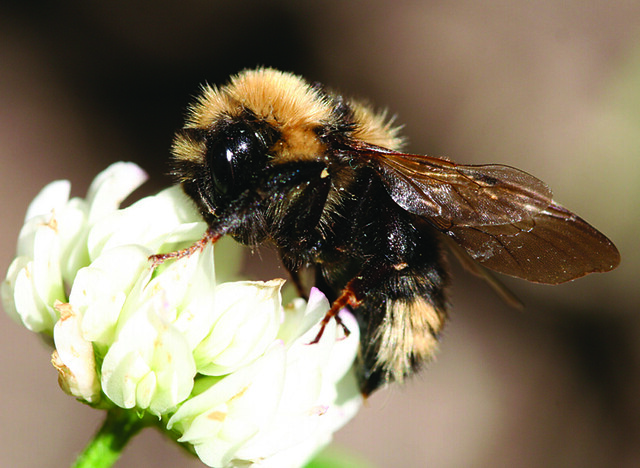
Bee populations in North America have been in decline since the 1940s. This is of great concern to the agriculture industry because about 75 percent of specialty crops depend on the services of pollinators – of which bees are the most economically important.
In the United States, honey bees and native bees are the most economically important species contributing approximately $15 billion in crop value. USDA’s National Institute of Food and Agriculture (NIFA) invests in research to investigate the reasons for the declining populations, promote pollinator health, reduce honey bee colony losses, and restore pollinator habitats.
Since 2008, NIFA has invested about $49 million in grants on research, education, and extension programs that address bee health. Among these is Michigan State University’s Integrated Crop Pollination project, where researchers and extension specialists have developed sustainable pollination strategies for both wild and managed bees. One of their successes was to develop landscape models to identify where best to establish native plants to enhance crop pollination, such as marginal soil sites near pollinator-dependent crops. Another project went to the University of Maryland, where researchers, extension specialists, and beekeepers refined and validated best management practices to minimize losses from pests and diseases.
In Minnesota, where the average mortality of honey bee colonies reached a record high of 51 percent in in 2014-2015, NIFA supported a multi-faceted University of Minnesota project to examine bees’ natural defenses against parasites and diseases, breed bees to enhance these traits, and develop ways to improve the overall management practices of honey bee colonies. Research findings include documenting the anti-microbial properties of propolis, which honey bees collect from tree resins to help fend off diseases in the hive. This is a major reversal in perception because beekeepers had long considered propolis to be a sticky nuisance.
NIFA-funded researchers at Washington State University (WSU) are using advanced technology to understand the honey bee’s past and preserve the best of the present in order to improve the species’ future. The team is studying the genetic consequences of parasites and diseases on the honey bee, which is not native to North America, and is using cryopreservation (freezing) to store honey bee semen in WSU’s Honey Bee Germplasm Repository. Identification of desired traits will allow beekeepers to select honey bee strains that are adapted to their specific geographic needs and be better able to fight off diseases and pests.
NIFA invests in and advances agricultural research, education, and extension and seeks to make transformative discoveries that solve societal challenges.



